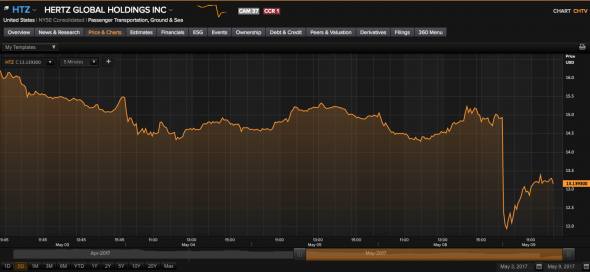Consider this part I, essential reading for folks interested in the big trends.
From FT Alphaville:
Anyone thinking of betting big on shared-mobility as the future of public transport should be alerted to one thing: the car-rental business is currently languishing.
On Monday, Hertz reported a bigger-than-expected quarterly loss cementing a generally poor quarter for the sector. Shares tanked accordingly:

Of note here are two key facts. The first is that the car rental business is a capital intensive one partial to low operating margins. And has always been. The second is that the industry as a consequence has long depended on auxiliary services — such as insurance, fuel surcharging and catching customers out on T&Cs — for profitability.Here's a longer view of the stock, Carl Icann doubled down on his earlier (2014) losing bet, buying 16 million of his 29.3 million total at $23.78 and giving us a couple investing lessons.
The active management of legacy fleet costs is a really big thing. To improve economies of scale, rental companies regularly shed excess inventory in off-peak periods and pick-up new stock again during the peak seasons. This, however, makes them extremely vulnerable to secondary market price swings and exposes them to their other big cost: asset depreciation.
You could say the rental business isn’t really about renting cars. It’s about borrowing money and selling used cars, while renting them in the interim.
As Morgan Stanley’s Adam Jonas noted after reviewing Hertz’ results this week:
It’s hard enough running a car rental firm in a normal environment. Now imagine running the firm during a time of falling industry pricing and rising fleet costs. On top of all that, now imagine trying to engineer a fundamental rethinking of how you engage the customer, manage the fleet, revamp IT and streamline non-fleet operations. We view such actions as mandatory in that they must be done to preserve the long-term value of the franchise irrespective of the pressure on near-term cash flow. What is less clear is where the money to fund this turnaround is going to come from.And regarding Avis’ Q1 results, posted on May 3 which disappointed the market by notching up a decline in revenue and a net loss of $107m:
It’s not Avis’s fault. In fact, we think Avis deserves a lot of credit for running a tight ship and managing the company well in a challenging environment. We just think the car rental industry is going through an extremely difficult time. The combined impact of pricing down and fleet costs up has been going on for nearly 3 years.There appear to be bigger forces at play that are throwing the entire car rental value chain up for grabs. Cutting costs, terming out debt and gaining share from weaker competitors may pay off in the longer term, but we do not believe will be sufficient in the short-term to fully offset some very powerful forces outside of the company’s control.Avis management believes the factors that led to its disappointing 1Q17 result are temporary. We are skeptical that they are temporary. In fact, we believe fundamentals in the business could get materially worse from this point before recovering and there may need to be a more cathartic cyclical event in the used car market before earnings revisions can begin moving in a positive direction.What shared autonomous mobility enthusiasts neglect is precisely this. The car rental market’s biggest challenge is not administrative or organisational, it’s financial.
The sector’s massive car inventories must be funded by someone at a cost-effective rate if the business is to remain viable. What’s more, this has been the case since the earliest days of the business, a long time, given the likes of Hertz started operations in 1920.
Try as they might, rental companies can only make money if the proceeds of after-use vehicles sales, rentals and auxiliaries surpass the collective cost of financing, depreciation, marketing, admin, maintenance and location. Financing is a critical component in that profitability equation as are conditions in the after-sale market.
A market for rental lemons
The structure of rental fleets is idiosyncratic and variable. Cars come in a multitude of different makes and models, and are almost never visibly branded on the outside. This is mostly because users demand this. Renters want to blend in with private vehicles users, and benefit from as wide a selection of vehicles as possible....MUCH MORE
Lesson # 1:
Don't double down. Double up.
Lesson #2
A $16 billion net worth comes in handy if your timing and/or thesis is off.
The stock is down another 8% at $11.48.